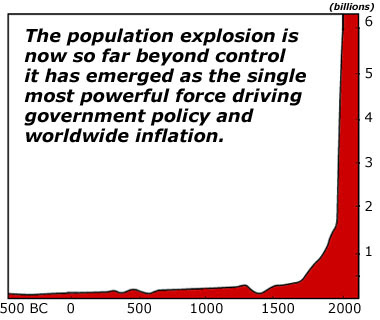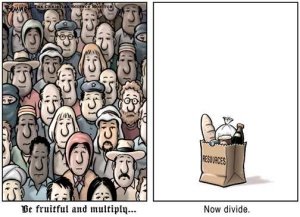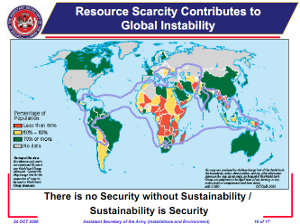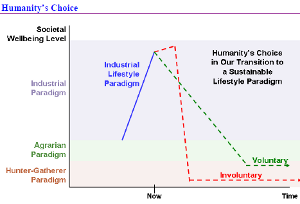Pregnant (Again) and Poor
Nicholas D. Kristof | New York Times
Nicholas D. Kristof | New York Times
Published: April 4, 2009
 Nicholas D. Kristof/The New York Times: Nahomie Nercure, 30, with some of her nine children in front of a her shack in the Haitian capital, Port au Prince.
Nicholas D. Kristof/The New York Times: Nahomie Nercure, 30, with some of her nine children in front of a her shack in the Haitian capital, Port au Prince.PORT-AU-PRINCE, Haiti: For all the American and international efforts to fight global poverty, one thing is clear: Those efforts won’t get far as long as women like Nahomie Nercure continue to have 10 children.
Global family-planning efforts have stalled over the last couple of decades, and Nahomie is emblematic both of the lost momentum and of the poverty that results. She is an intelligent 30-year-old woman who wanted only two children, yet now she is eight months pregnant with her 10th.
As we walked through Cité Soleil, the Haitian slum where she lives, her elementary-school-age children ran stark naked around her. The $6-a-month rental shack that they live in — four sleep on the bed, six on the floor beside it — has no food of any kind in it. The family has difficulty paying the fees to keep the children in school.
There’s simply no way to elevate Nahomie’s family, and millions like it around the world, unless we help such women have fewer children. And yet family-planning programs have been shorn of resources and glamour for a generation now.


![[Population, Resources, and Human Idealism, Energy Bulletin | Population Growth: Most Powerful Force on Earth, Money&Markets] To advocate for human rights, peace, and social justice while ignoring their necessary ecological basis --— a stable human population – at, or slightly less than – the eco-systems long term carrying capacity --- is intellectual dishonesty and hypocrisy.](https://blogger.googleusercontent.com/img/b/R29vZ2xl/AVvXsEhljkaQ3IdsYDlSwhqhtUnur61OFNUIuUgCFkHJkPpL8xPGnZXOzxFfJhTNPxDBODu49hCXKuWfp9l-gQug0wi_EqHClb-iZXZeBXWG1GD0X9D9GQXZCuzB5yP8UHUi6YxWBn6knrpLdx8/s400/ratsbrutalisation.jpg)
 The Frankel Investment Scheme operates as an importer and exporter of Active Pharmaceutical Ingredients (API) from foreign countries. These ingredients are used by manufacturers of generic medicines and a large part of the API's are used in the manufacturing of the anti retroviral drug prescribed to people who were exposed to or contracted the HIV/Aids virus.
The Frankel Investment Scheme operates as an importer and exporter of Active Pharmaceutical Ingredients (API) from foreign countries. These ingredients are used by manufacturers of generic medicines and a large part of the API's are used in the manufacturing of the anti retroviral drug prescribed to people who were exposed to or contracted the HIV/Aids virus.  Schiff, president of Euro Pacific Capital, is familiar to everyone who has watched financial coverage in the last year. He is famed for being the most vocal financial economist to have perfectly predicted the crash.
Schiff, president of Euro Pacific Capital, is familiar to everyone who has watched financial coverage in the last year. He is famed for being the most vocal financial economist to have perfectly predicted the crash.
 On Friday last week Johannesburg businessman Christopher Leppan applied to the Johannesburg High Court to have Barry Deon Tannenbaum, until recently of Rivonia, declared bankrupt.
On Friday last week Johannesburg businessman Christopher Leppan applied to the Johannesburg High Court to have Barry Deon Tannenbaum, until recently of Rivonia, declared bankrupt.


 05/29/09 London, England Last weekend, we journeyed to Boston to attend a college graduation. Thousands of callow scholars were on display. Each was handed his papers…and then marched out of the hockey stadium. To the tune of ‘Pomp & Circumstance,’ wearing a long, red robe, he entered the outside world solemnly…like a patsy joining a poker game.
05/29/09 London, England Last weekend, we journeyed to Boston to attend a college graduation. Thousands of callow scholars were on display. Each was handed his papers…and then marched out of the hockey stadium. To the tune of ‘Pomp & Circumstance,’ wearing a long, red robe, he entered the outside world solemnly…like a patsy joining a poker game. President Hugo Chavez claimed this week that he and his Cuban ally Fidel Castro are more conservative than left-wing U.S. President Barack Obama, referring to the American government bailout and takeover of General Motors, Reuters reported.
President Hugo Chavez claimed this week that he and his Cuban ally Fidel Castro are more conservative than left-wing U.S. President Barack Obama, referring to the American government bailout and takeover of General Motors, Reuters reported. It must be said, that like the breaking of a great dam, the American decent into Marxism is happening with breath taking speed, against the back drop of a passive, hapless sheeple, excuse me dear reader, I meant people.
It must be said, that like the breaking of a great dam, the American decent into Marxism is happening with breath taking speed, against the back drop of a passive, hapless sheeple, excuse me dear reader, I meant people. ![[Д♠]SS:: ApacheTom.22.CrazyHorse ::SS[♠Д] Depopulation of a Planet (1/6): Thinning Out The](https://blogger.googleusercontent.com/img/b/R29vZ2xl/AVvXsEg10TE_eYfmaH_SV6M1xys0QbObH1lK9I4hbnoJX1OPUfl9VlTTpagzxoALJe65GU_RpKcX1fH7yPNLgSjJJdUETZkLAzXNj9iw0NAEtk5rDRGytGIWh-dCGOhiuQJcFtg_-W9Np1wC_Rs/s400/AttheLimit.jpg)

 Consider what it means to live through our times in the light of economic understanding. Even in the face of calamity, there is no mystery and hence fear is reduced. You look at department stores going belly-up, and you know why. You see parking lots empty, and you know the reason. You have friends losing their jobs, and there is clarity concerning the cause. You see depositors in failing banks lose their money, and you are not surprised. Prices behave in ways that shock and surprise everyone else, but you know what's what.
Consider what it means to live through our times in the light of economic understanding. Even in the face of calamity, there is no mystery and hence fear is reduced. You look at department stores going belly-up, and you know why. You see parking lots empty, and you know the reason. You have friends losing their jobs, and there is clarity concerning the cause. You see depositors in failing banks lose their money, and you are not surprised. Prices behave in ways that shock and surprise everyone else, but you know what's what. 



